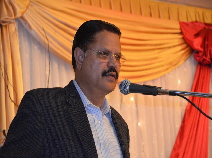|
By Abdus Sattar Ghazali
The Urdu Academy of North America, led by poet Tashie Zaheer, held its monthly literary event on November 18, 2012 at the ornate Chandni Restaurant, Fremont/Newark. The event, chaired by Shamsun Nahar, was dedicated to the life and work of a distinguished contemporary poet Qabil Ajmeri who left for eternal abode at the age of 31. In his short span of life Qabil Ajmeri left a deep impression on the Urdu poetry and many of his verses became household sayings. A few, oft-quoted couplets penned by Qabil are:
Dr. Tahir Mahmood, a senior member of the Urdu Academy, presented a well-researched maqala on the life and work of Qabil Ajmeri who was born on August 27, 1931, as Abdul Rahim in Churli, a town located 24 miles from Ajmer, Rajistan. He received his early education in Ajmer. Ajmeri was orphaned at age seven; his father died of tuberculosis, and his mother died shortly afterwards. His younger sister, Fatma, died within a few years.
In January 1948, Ajmeri migrated to Pakistan with his brother, Sharif, without any provisions, after joining a caravan headed across the border. They then settled in Hyderabad, Sindh. After a while, Qabil’s brother contracted tuberculosis and died.
Ajmeri began writing poetry at an early age, and become famous in his locality for his poetry by age 14. His breakthrough came in a poetry session featuring the well-known poet Molana Mani Ajmeri, who had been reciting poems for some time and intended to go on hiatus.
After migrating to Hyderabad, Sindh, Pakistan in December 1947, he became popular at mushairas, and was recognized as a "senior" poet of Urdu at the age of 21, along with other veterans of Hyderabad, including Akhter Ansari Akberabadi, Mohsin Bhopali, and Himayat Ali Shaer. After migrating to Pakistan, he began writing a "qataa", or quatrain, every day in the daily Javed, Hyderabad. Later on, his quatrains were published in the weekly Aftab, Hyderabad.
Ajmeri wrote both ghazals and nazms. He published compilations of Urdu poetry and a volume on philosophy, named the "Deeda e Baydar". He is known as one of Urdu's last romantic poets.
According to Rauf Parekh, Ghazal was the genre in which Qabil chose to express himself, though his nazms, or poems, also reflect his mind. They are, however, fewer in number and do not really achieve the subtlety that his ghazals do. Ghazal, as Dr Farman Fatehpuri has said in his book Urdu ghazal aur Pakistani muaashra, is one of the most popular and most delicate yet most difficult of all genres of Urdu poetry. Ghazal demands classicism, symbolic icons, a deep sense of the poetic tradition, imagery and a diction of its own. This is one of the reasons why those who write ghazal can rarely master it fully and it remains elusive, just like the traditional lover of which it sings. The 20th century Urdu poets who truly recognised the texture and temperament of ghazal, and composed it in its all traditional beauty and delicacy, says Dr Fatehpuri, are few and far between and Qabil Ajmeri is one of them. [Qabil Ajmeri — ‘the inheritor of unfulfilled renown’ by Rauf Parekh – Dawn September 23, 2008]
Ajmeri was admitted to several hospitals, and in 1960, he was sent to a Quetta sanatorium, where he met Nargis Susan, a nurse who was impressed with his poetry and who later converted to Islam. Afterwards, they married, and had one son, Zafar qabil.
Ajmeri died of tuberculosis in Hyderabad on October 3, 1962, at the age of 31.
Waheedur-ur-Rehman Khan, a young researcher from Lahore, published his dissertation on Qabil, titled Mutala-i-Qabil. This much-needed work is really welcome as there has hardly been any reference material available on Qabil, apart from a few sporadic articles and a few special issues of some literary magazines — although more than a decade ago, Karachi’s Fareed Publishers published Qabil’s collected works, named Kulliyaat-i-Qabil.
As usual Dr. Tahir Mahmood’s maqala, with his eloquent delivery, was interspersed with the poetry of Qabil Ajmeri. Among those who recited included: Arvind Kumar, Asem Bajwa, Irshad Ali, Khalid Rana, Manzar Salam, Meraj Sultana Ghazali, Misbah Rehman, Syed Mujeebur Rehman, Mukesh Kackar, Razia Shamim, Shamsun Nahar, Tasadduq Attari and Abdus Sattar Ghazali.
Mini Mushaera
The second session of the literary evening was devoted to the creation of the poets present at the event. Among those who participated in the Mushaera included: Moez Khan, Mobeen Khalil, Waqar Khan, Syed Mujeebur Rehman, Misbah Rehman, Aneela Bhullar, Arshad Rashid, Lubna Manzar, Huyamyun Naseer and Tashie Zaheer.
This was Aneela Bhullar’s debut at the Urdu Academy. Perhaps she stole the show with her touchy verses and melodious presentation. Tashie Zaheer was a senior and most sought after poet of the mini mushaera.
An interesting feature of the mini mushaera was that Mr. Syed Sarwat & Mrs. Munza Sarwat, Urdu lovers and patrons of the Urdu Academy graced the occasion.
The program ended with a vote of thanks by Nagesh Avadhani. The MC of the first session was Dr. Tahir Mahmood while Arshad Rashid was MC for the second session.
Read poetry of Qabil Ajmeri / See Picture Gallery
|